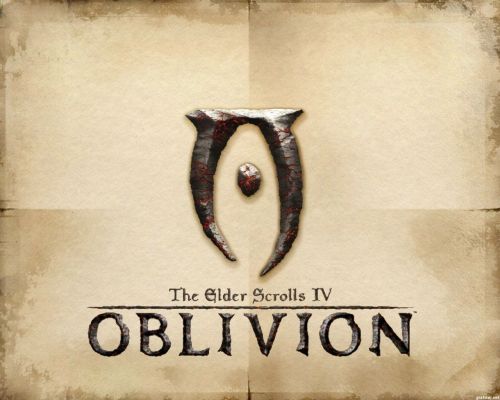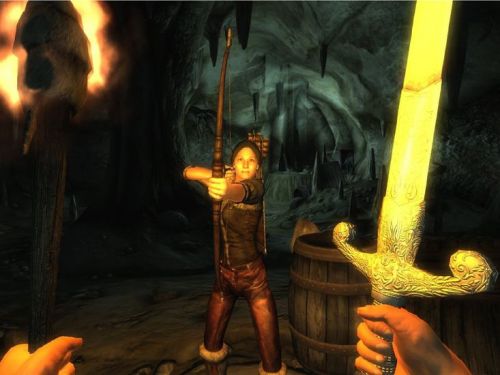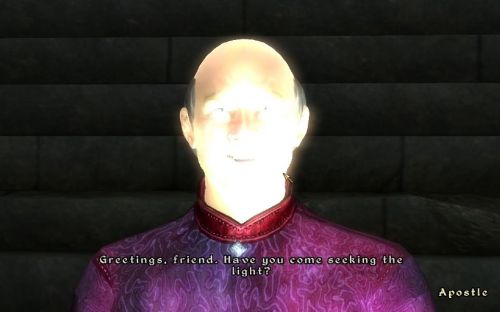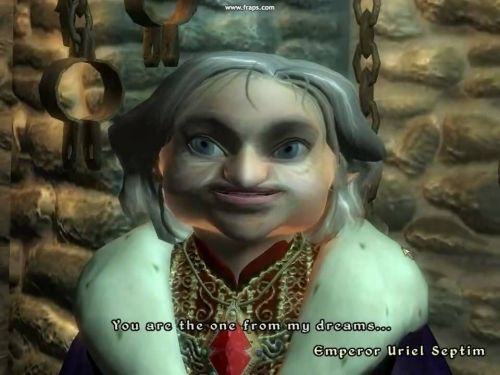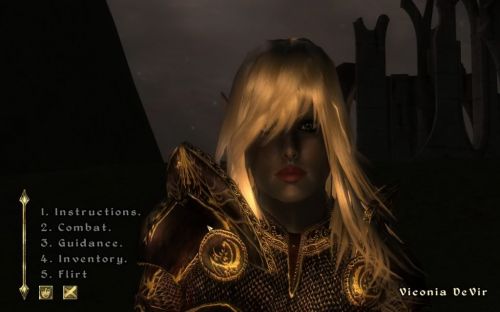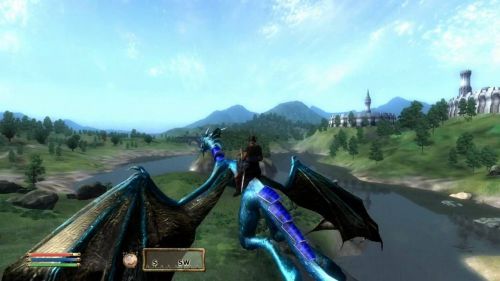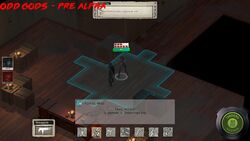RPG Codex Retrospective Review: The Elder Scrolls IV: Oblivion (2006)
RPG Codex Retrospective Review: The Elder Scrolls IV: Oblivion (2006)
Review - posted by Infinitron on Fri 1 April 2016, 20:45:25
Tags: Bethesda Softworks; The Elder Scrolls IV: Oblivion[Review by Deuce Traveler]
Here's the review you've been waiting for ever since my universally well-received Morrowind retrospective. I felt Morrowind was the best game in the Elder Scrolls series, and Oblivion is a huge let down in comparison. Even at their worst, the previous games in the series usually had some aspect that made them memorable and often groundbreaking. In contrast, Oblivion stands out for its glaring mediocrity.
Before I slam Oblivion's story and setting, it's important to talk about some of the systems changes it makes, starting with character creation and level progression. The skill system streamlining trend we've observed from Daggerfall to Morrowind continues here, with Axe now falling under the Blunt weapons skill, Short Blade and Long Blade combined into a single Blade skill, and Medium Armor, Spear, and Enchantment removed entirely. Of all the removed skills, the one I miss the most is Medium Armor. Its removal leads to a reduction of the total number of armor pieces available in the game, removing the option for the cool patchwork look that my character possessed as he progressed through Morrowind. But other than that, all the Elder Scrolls races from elves to Khajiit are still available, and you can also choose a birth sign that offers certain advantages. Overall, Oblivion's character creation is still recognizable to oldschool fans.
Gameplay is similar too, with the usual mouse-based controls for swinging your weapon or firing your bow. The default keybindings are a step up from previous games and feel more intuitive, though this is a minor improvement since you could always just change them. Another improvement is the return of fast travel (but only for locations you've visited), which was sorely missing in Morrowind, making this game just a bit less of a hiking simulator. A step down from the previous game is your manner of interaction with NPCs. People will favor you if you've peformed heroic deeds or if you have a good relationship with their faction. However, there's also a conversation minigame connected to your Speechcraft skill, which affects NPC dispositions if you succeed at it, but its implementation is a pile of rubbish that deserves to be buried in a deep hole. But the biggest pile of rubbish in Oblivion is its leveling system.
Morrowind was a huge game, which meant that the main quest could become quite easy if you spent lots of time completing all of the side quests and exploring all of the dungeons. I didn't mind this, as I felt it was a just reward for those players that had engaged deeply with everything the open world had to offer. The folks at Bethesda must have seen a problem with it however, so for Oblivion they decided to go with a level scaling system, and to a ridiculous degree. Just as in all previous games in the series except for Battlespire, my character was a dark elf (Dunmer) character that relied upon stealth, a bow and a sword, with a smattering of illusion and restoration spells for support. In the game's first dungeon, I was killing rats and mudcrabs with single hit sneak attacks using the worst weapons. But at level 30+ and with the best weapons in the game, I needed multiple blows to take out those same rats, since they'd been scaled upward to match my level. With this system, bandits in the middle of nowhere could go from wearing leather armor at the beginning of the game to wearing amazing daedric armor if you encountered them towards the endgame. If you decided to shut the Oblivion gates early in the game, you would face low-level melee enemies, but if you waited until your character was stronger, you would face the most infuriating daedric foes, capable of going toe-to-toe against you with a dangerous mixture of magic and melee attacks.
Skills in Oblivion are still increased either by training (which increases in price as your skill level increases) or through heavy use. Attribute increases for three of your attributes are granted on level up, based on which skills you used. For example, if you use Strength-based skills often enough (10 or more skill points), then you can increase that attribute by five points. If you gain the level too quickly you might see a smaller increase. You level up whenever you increase any combination of your class skills by a total of ten points. This is the same system as Morrowind, but here it creates an interesting dilemma when coupled with the aggressive level scaling.
You see, in Morrowind even fast leveling with minimal attribute gain was still a positive thing due to the maximum hit point and mana increases. However, once you introduce level scaling you now have an incentive not to level. Yes, Oblivion is a bizarro world RPG where you want to avoid leveling up. It may be the only RPG that has ever caused min-maxers to play with the intent of dragging out level ups. It works like this. You can choose seven skills as your major class skills. I typically lean upon Blade, Marksman, Security, Heavy Armor, and Stealth skills, with various magic skills for backup. I hardly ever use Mercantile, Hand-to-Hand, Armorer, Alchemy, Blunt, Destruction and Speechcraft. So of course I choose the latter as my major skills, and take the hit of poor starting scores for the skills I will actually depend upon in practice. Now I can almost completely control when I level up, and will likely be able to increase my desired attributes by five points each time I do. Enemies remain relatively weak while my character grows more powerful than the game anticipated. Thus a min-maxer can still game the system despite all the effort made by the developers to maintain difficulty throughout. Way to go!
The magic system in Oblivion has also been changed, continuing the series' streamlining trend. In Arena, you were able to disintegrate walls to traverse through dungeons. By Morrowind, that sort of magic was gone but you were at least able to cast spells that allowed you to fly. Oblivion has decided to ditch that capability, which is a damn shame as the game has a lot of mountainous terrain which would have been wonderful to fly over. Even more puzzling, the Mark and Recall spells have also been removed, for no perceivable reason other than the developers running out of time. On the plus side, there are a few new spells, but I'll talk about those and how useful I found them when I discuss the game's quests.
Honestly, I can't really get too upset with all of this streamlining, even if it dumbed down the game (100% casting success rates), took away roleplaying options (quest-related chests can't be opened by lockpicking), and broke any semblance of the world being governed by reality (omniscient guards). Oblivion isn't really much of a game anyway - I see it as more of an adventure construction toolset with nice presentation than as an actual roleplaying experience. The game world itself is so dull compared to what we saw in previous games. In Daggerfall, the various regions of the map were distinct from one another in architecture, terrain and mode of dress. In Morrowind even more so. Oblivion's version of Tamriel, in comparison, is incredibly bland. Except for a few Norse villages, the majority of the cities and towns look as if the art team took photos of Disney castles and stills from the movie Gladiator and used them as a template to build a squeaky clean civilization of white marble and bloom effects that don't make any sense in a world that still depends on burning wood and coal for heat. The actual daedric realm of Oblivion is even more disappointing, after the first ten minutes of initial terror. In Battlespire, Oblivion is described as an odd realm that is a sort of hell which the daedra fall into when 'killed'. It is a chaotic place that even they fear. This description is completely retconned in the game Oblivion - the realm is now highly organized and populated with enemy forces prepared to invade Tamriel. You gradually realize that it looks the same no matter where you decide to explore, with no surprises to be found after your first visit. There is only so much dark crimson and orange a player can take before it loses its charm. Which leads us to the topic of the game's main quest and the reason for entering the Oblivion gates in the first place.
Spoiler alert: I am about to speak in depth about the plot of an old game. Oblivion starts off with your character in prison, a common theme in the Elder Scrolls series, before once again becoming entangled in a secret mission assigned to you by the Emperor. However, this is the last time he's going to get you involved in one of his schemes, as he is assassinated by daedra worshippers in front of your eyes. These cultists murder the Emperor because of his never-before-seen daedra-stopping magical powers, and now there's an invasion that only the last surviving descendant of the Emperor can stop with his magical bloodline powers. Note: You are not the Emperor's last surviving descendant, but rather his chosen fetch quest participant. While the last descendant is hanging out and training (which should totally have been shown as an 80s-style training montage), your character has to ensure that all of the actual work gets done for his final confrontation with the daedra leader. It's a generic, lazy, and forgettable plot, with only a few bright spots that stand out like jewels in dust.
One of these brighter spots is the existence of two different paths towards the endgame, a 'good' path and a somewhat more sinister 'evil' path. In the good path, you work with organizations such as the Blades to improve your skills and equipment for your final showdown against the daedric forces. The Blades have a pretty sweet mountain fortress that's worth checking out. Some of the side quests on this path are also pretty cool, such as one where you enter a painting in order to find out a secret about the man who created it. I found that crafting your own illusion spells could be useful for this adventure, since the adversaries involved are very tough and you will want to avoid a fight as best you can.
Another one of Oblivion's bright spots is Vilja, an NPC who joins your quest and tries to encourage you towards good behavior. Vilja has unique quests and is romanceable if you help her with some of her more complicated problems. Also, she has some surprising interactions with the world, such as in Red Rose Manor where she suddenly takes an interest in art. These little quirks add a lot of personality and make her stand out compared to Bethesda's usual two dimensional characters. Martin is another NPC who is critical to the game's storyline, but unfortunately he is a bit of a blank slate. He encourages you to try and gather the nobility behind your efforts to close the Oblivion gates, but he is the only one in the game that seems to care about them. The Oblivion gates have no significant impact on Tamriel except for a town called Kvatch, which is destroyed before you even get to it. The nobles Martin tries to encourage you to work with don't seem to care or even notice what is happening around them, and life pretty much goes on as if the end of the world isn't nigh.
You would think that the guilds of Tamriel would be an effective bulwark against the daedric threat. I mean, if my level five character can easily close an Oblivion gate by himself, a couple of guys from the Fighters Guild and Mages Guild would be that much more effective. But no, instead they're mostly busy with guild politics, and you can't even change that when you take over one of them. The Grandmaster tower that you gain when you reach the highest rank of the Mages Guild is a cramped let-down of little use. The guild's only saving grace is a magic shopkeeper located outside the Arcane University called Midas, who helps you develop several unique and helpful spells if you take the time to gather the right components. Some of these spells do nifty things such as force pushing and transmuting objects.
Oblivion also has 'neutral' questlines with little bearing on the main storyline, such as the Thieves Guild and Arena quests. I rather liked how the Thieves Guild plot was set up. It is not a public organization - instead you hear about it through word of mouth, and may also be approached if you show yourself to have flexible morals, akin to how you're recruited in Daggerfall. The guild's main quest has an interesting backstory, and I was actually eager to see it to the end, especially because of some of the neat loot you can get.
The Arena is for the most part just a place for mindless fun, with a dumb side quest thrown in and an even dumber ending if you complete it, though it is a decent way to improve your combat skills. I found that various tactics could be effective in the Arena depending on one's character build - brute force, ranged hit and run attacks, or a mixture of invisibility and damaging status effects. Some spells are more effective than others - I found a particular spell called Estrus to be especially overpowered against certain foes.
Oblivion's 'evil' plotline is a bit dark but not really horrible. The important thing to remember is that you are playing once more as the Nerevarine, imprisoned again due to a misunderstanding with the Emperor at the beginning of the game. Because of this, it makes sense that you should place the Dunmer interest before the Empire's. So instead of recruiting Vilja, you can recruit a fellow dark elf by the name of Viconia DeVir. Her unique questline is not nearly as well written as Vilja's, but it makes more sense for her to be following you because of your character's identity and her knack for deception and violence. After freeing her from imprisonment, the two of you embark on a campaign of information warfare. First, you convince everyone that you're an ambassador on behalf of a land of dragons, giving you the ability to move freely around the land without being spied upon. Then, you work to keep the local noble families off balance and distrustful, making it impossible for them to work together. You do this both covertly and overtly.
Covertly, you can join the Dark Brotherhood and go on a murder spree, assassinating men and women in places of authority. In one truly worthwhile quest, you pretend to participate in a fantasy version of Big Brother, only to turn the event into a horror show where you murder the other participants one by one, while encouraging them to fear and suspect the others. When you are finally done sowing chaos, you turn against the other members of the Dark Brotherhood and cause the organization to destroy itself from within.
Overtly, you become a bit of a national hero after saving the town of Kvatch. After closing the nearby Oblivion gate, you can use some of the wealth you've collected to help rebuild the town. After some time and expenditure, you restore much of it to its former glory and are made leader. Because of your past effectiveness against the daedra, the other lords slowly begin relying more and more upon your skills and soldiers. They become complacent, expecting you to do something about their own nearby Oblivion gates. You promise them aid that never comes, further reducing their revenues from trade and causing them to hoard resources in a never-ending cycle that leaves their economies in shambles. To top it all off, you engage in machinations that result in the last descendant of the Emperor perishing in battle against the daedric forces, which leaves a leadership vacuum that guarantees the dissolution of the Empire and greater freedom for the Dunmer people.
To sum things up, Oblivion is a disappointing vanilla RPG with few memorable moments. I stand by my conclusion that it is a better toolkit for modders than it is a game. I suggest giving this little stinker a pass unless some of its more idiosyncratic aspects drive you to try it anyway. After all, there are some moments that shine, like the very ending of the game where the Nerevarine rumors meet reality and you get to ride a freaking dragon into the sunset.
Here's the review you've been waiting for ever since my universally well-received Morrowind retrospective. I felt Morrowind was the best game in the Elder Scrolls series, and Oblivion is a huge let down in comparison. Even at their worst, the previous games in the series usually had some aspect that made them memorable and often groundbreaking. In contrast, Oblivion stands out for its glaring mediocrity.
Before I slam Oblivion's story and setting, it's important to talk about some of the systems changes it makes, starting with character creation and level progression. The skill system streamlining trend we've observed from Daggerfall to Morrowind continues here, with Axe now falling under the Blunt weapons skill, Short Blade and Long Blade combined into a single Blade skill, and Medium Armor, Spear, and Enchantment removed entirely. Of all the removed skills, the one I miss the most is Medium Armor. Its removal leads to a reduction of the total number of armor pieces available in the game, removing the option for the cool patchwork look that my character possessed as he progressed through Morrowind. But other than that, all the Elder Scrolls races from elves to Khajiit are still available, and you can also choose a birth sign that offers certain advantages. Overall, Oblivion's character creation is still recognizable to oldschool fans.
Gameplay is similar too, with the usual mouse-based controls for swinging your weapon or firing your bow. The default keybindings are a step up from previous games and feel more intuitive, though this is a minor improvement since you could always just change them. Another improvement is the return of fast travel (but only for locations you've visited), which was sorely missing in Morrowind, making this game just a bit less of a hiking simulator. A step down from the previous game is your manner of interaction with NPCs. People will favor you if you've peformed heroic deeds or if you have a good relationship with their faction. However, there's also a conversation minigame connected to your Speechcraft skill, which affects NPC dispositions if you succeed at it, but its implementation is a pile of rubbish that deserves to be buried in a deep hole. But the biggest pile of rubbish in Oblivion is its leveling system.
Morrowind was a huge game, which meant that the main quest could become quite easy if you spent lots of time completing all of the side quests and exploring all of the dungeons. I didn't mind this, as I felt it was a just reward for those players that had engaged deeply with everything the open world had to offer. The folks at Bethesda must have seen a problem with it however, so for Oblivion they decided to go with a level scaling system, and to a ridiculous degree. Just as in all previous games in the series except for Battlespire, my character was a dark elf (Dunmer) character that relied upon stealth, a bow and a sword, with a smattering of illusion and restoration spells for support. In the game's first dungeon, I was killing rats and mudcrabs with single hit sneak attacks using the worst weapons. But at level 30+ and with the best weapons in the game, I needed multiple blows to take out those same rats, since they'd been scaled upward to match my level. With this system, bandits in the middle of nowhere could go from wearing leather armor at the beginning of the game to wearing amazing daedric armor if you encountered them towards the endgame. If you decided to shut the Oblivion gates early in the game, you would face low-level melee enemies, but if you waited until your character was stronger, you would face the most infuriating daedric foes, capable of going toe-to-toe against you with a dangerous mixture of magic and melee attacks.
Skills in Oblivion are still increased either by training (which increases in price as your skill level increases) or through heavy use. Attribute increases for three of your attributes are granted on level up, based on which skills you used. For example, if you use Strength-based skills often enough (10 or more skill points), then you can increase that attribute by five points. If you gain the level too quickly you might see a smaller increase. You level up whenever you increase any combination of your class skills by a total of ten points. This is the same system as Morrowind, but here it creates an interesting dilemma when coupled with the aggressive level scaling.
You see, in Morrowind even fast leveling with minimal attribute gain was still a positive thing due to the maximum hit point and mana increases. However, once you introduce level scaling you now have an incentive not to level. Yes, Oblivion is a bizarro world RPG where you want to avoid leveling up. It may be the only RPG that has ever caused min-maxers to play with the intent of dragging out level ups. It works like this. You can choose seven skills as your major class skills. I typically lean upon Blade, Marksman, Security, Heavy Armor, and Stealth skills, with various magic skills for backup. I hardly ever use Mercantile, Hand-to-Hand, Armorer, Alchemy, Blunt, Destruction and Speechcraft. So of course I choose the latter as my major skills, and take the hit of poor starting scores for the skills I will actually depend upon in practice. Now I can almost completely control when I level up, and will likely be able to increase my desired attributes by five points each time I do. Enemies remain relatively weak while my character grows more powerful than the game anticipated. Thus a min-maxer can still game the system despite all the effort made by the developers to maintain difficulty throughout. Way to go!
The magic system in Oblivion has also been changed, continuing the series' streamlining trend. In Arena, you were able to disintegrate walls to traverse through dungeons. By Morrowind, that sort of magic was gone but you were at least able to cast spells that allowed you to fly. Oblivion has decided to ditch that capability, which is a damn shame as the game has a lot of mountainous terrain which would have been wonderful to fly over. Even more puzzling, the Mark and Recall spells have also been removed, for no perceivable reason other than the developers running out of time. On the plus side, there are a few new spells, but I'll talk about those and how useful I found them when I discuss the game's quests.
Honestly, I can't really get too upset with all of this streamlining, even if it dumbed down the game (100% casting success rates), took away roleplaying options (quest-related chests can't be opened by lockpicking), and broke any semblance of the world being governed by reality (omniscient guards). Oblivion isn't really much of a game anyway - I see it as more of an adventure construction toolset with nice presentation than as an actual roleplaying experience. The game world itself is so dull compared to what we saw in previous games. In Daggerfall, the various regions of the map were distinct from one another in architecture, terrain and mode of dress. In Morrowind even more so. Oblivion's version of Tamriel, in comparison, is incredibly bland. Except for a few Norse villages, the majority of the cities and towns look as if the art team took photos of Disney castles and stills from the movie Gladiator and used them as a template to build a squeaky clean civilization of white marble and bloom effects that don't make any sense in a world that still depends on burning wood and coal for heat. The actual daedric realm of Oblivion is even more disappointing, after the first ten minutes of initial terror. In Battlespire, Oblivion is described as an odd realm that is a sort of hell which the daedra fall into when 'killed'. It is a chaotic place that even they fear. This description is completely retconned in the game Oblivion - the realm is now highly organized and populated with enemy forces prepared to invade Tamriel. You gradually realize that it looks the same no matter where you decide to explore, with no surprises to be found after your first visit. There is only so much dark crimson and orange a player can take before it loses its charm. Which leads us to the topic of the game's main quest and the reason for entering the Oblivion gates in the first place.
Spoiler alert: I am about to speak in depth about the plot of an old game. Oblivion starts off with your character in prison, a common theme in the Elder Scrolls series, before once again becoming entangled in a secret mission assigned to you by the Emperor. However, this is the last time he's going to get you involved in one of his schemes, as he is assassinated by daedra worshippers in front of your eyes. These cultists murder the Emperor because of his never-before-seen daedra-stopping magical powers, and now there's an invasion that only the last surviving descendant of the Emperor can stop with his magical bloodline powers. Note: You are not the Emperor's last surviving descendant, but rather his chosen fetch quest participant. While the last descendant is hanging out and training (which should totally have been shown as an 80s-style training montage), your character has to ensure that all of the actual work gets done for his final confrontation with the daedra leader. It's a generic, lazy, and forgettable plot, with only a few bright spots that stand out like jewels in dust.
One of these brighter spots is the existence of two different paths towards the endgame, a 'good' path and a somewhat more sinister 'evil' path. In the good path, you work with organizations such as the Blades to improve your skills and equipment for your final showdown against the daedric forces. The Blades have a pretty sweet mountain fortress that's worth checking out. Some of the side quests on this path are also pretty cool, such as one where you enter a painting in order to find out a secret about the man who created it. I found that crafting your own illusion spells could be useful for this adventure, since the adversaries involved are very tough and you will want to avoid a fight as best you can.
Another one of Oblivion's bright spots is Vilja, an NPC who joins your quest and tries to encourage you towards good behavior. Vilja has unique quests and is romanceable if you help her with some of her more complicated problems. Also, she has some surprising interactions with the world, such as in Red Rose Manor where she suddenly takes an interest in art. These little quirks add a lot of personality and make her stand out compared to Bethesda's usual two dimensional characters. Martin is another NPC who is critical to the game's storyline, but unfortunately he is a bit of a blank slate. He encourages you to try and gather the nobility behind your efforts to close the Oblivion gates, but he is the only one in the game that seems to care about them. The Oblivion gates have no significant impact on Tamriel except for a town called Kvatch, which is destroyed before you even get to it. The nobles Martin tries to encourage you to work with don't seem to care or even notice what is happening around them, and life pretty much goes on as if the end of the world isn't nigh.
You would think that the guilds of Tamriel would be an effective bulwark against the daedric threat. I mean, if my level five character can easily close an Oblivion gate by himself, a couple of guys from the Fighters Guild and Mages Guild would be that much more effective. But no, instead they're mostly busy with guild politics, and you can't even change that when you take over one of them. The Grandmaster tower that you gain when you reach the highest rank of the Mages Guild is a cramped let-down of little use. The guild's only saving grace is a magic shopkeeper located outside the Arcane University called Midas, who helps you develop several unique and helpful spells if you take the time to gather the right components. Some of these spells do nifty things such as force pushing and transmuting objects.
Oblivion also has 'neutral' questlines with little bearing on the main storyline, such as the Thieves Guild and Arena quests. I rather liked how the Thieves Guild plot was set up. It is not a public organization - instead you hear about it through word of mouth, and may also be approached if you show yourself to have flexible morals, akin to how you're recruited in Daggerfall. The guild's main quest has an interesting backstory, and I was actually eager to see it to the end, especially because of some of the neat loot you can get.
The Arena is for the most part just a place for mindless fun, with a dumb side quest thrown in and an even dumber ending if you complete it, though it is a decent way to improve your combat skills. I found that various tactics could be effective in the Arena depending on one's character build - brute force, ranged hit and run attacks, or a mixture of invisibility and damaging status effects. Some spells are more effective than others - I found a particular spell called Estrus to be especially overpowered against certain foes.
Oblivion's 'evil' plotline is a bit dark but not really horrible. The important thing to remember is that you are playing once more as the Nerevarine, imprisoned again due to a misunderstanding with the Emperor at the beginning of the game. Because of this, it makes sense that you should place the Dunmer interest before the Empire's. So instead of recruiting Vilja, you can recruit a fellow dark elf by the name of Viconia DeVir. Her unique questline is not nearly as well written as Vilja's, but it makes more sense for her to be following you because of your character's identity and her knack for deception and violence. After freeing her from imprisonment, the two of you embark on a campaign of information warfare. First, you convince everyone that you're an ambassador on behalf of a land of dragons, giving you the ability to move freely around the land without being spied upon. Then, you work to keep the local noble families off balance and distrustful, making it impossible for them to work together. You do this both covertly and overtly.
Covertly, you can join the Dark Brotherhood and go on a murder spree, assassinating men and women in places of authority. In one truly worthwhile quest, you pretend to participate in a fantasy version of Big Brother, only to turn the event into a horror show where you murder the other participants one by one, while encouraging them to fear and suspect the others. When you are finally done sowing chaos, you turn against the other members of the Dark Brotherhood and cause the organization to destroy itself from within.
Overtly, you become a bit of a national hero after saving the town of Kvatch. After closing the nearby Oblivion gate, you can use some of the wealth you've collected to help rebuild the town. After some time and expenditure, you restore much of it to its former glory and are made leader. Because of your past effectiveness against the daedra, the other lords slowly begin relying more and more upon your skills and soldiers. They become complacent, expecting you to do something about their own nearby Oblivion gates. You promise them aid that never comes, further reducing their revenues from trade and causing them to hoard resources in a never-ending cycle that leaves their economies in shambles. To top it all off, you engage in machinations that result in the last descendant of the Emperor perishing in battle against the daedric forces, which leaves a leadership vacuum that guarantees the dissolution of the Empire and greater freedom for the Dunmer people.
To sum things up, Oblivion is a disappointing vanilla RPG with few memorable moments. I stand by my conclusion that it is a better toolkit for modders than it is a game. I suggest giving this little stinker a pass unless some of its more idiosyncratic aspects drive you to try it anyway. After all, there are some moments that shine, like the very ending of the game where the Nerevarine rumors meet reality and you get to ride a freaking dragon into the sunset.
There are 63 comments on RPG Codex Retrospective Review: The Elder Scrolls IV: Oblivion (2006)





